Urine bicarbonate excretion associated with cystic fibrosis transmembrane conductance regulator function
1. In this prospective cohort study, carbonate excretion levels in cystic fibrosis (CF) patients were correlated with various disease severity markers.
2. At six months after treatment with elexacaftor/tezacaftor/ivacaftor, improvements were seen in bicarbonate excretion, predicted forced expiratory volume in one second (ppFEV1), and sweat chloride concentrations.
Evidence Rating Level: 2 (Good)
Study Rundown: CF is a genetic condition caused by mutations in the cystic fibrosis transmembrane conductance regulator (CFTR) anion channel, leading to multiorgan disease. Patients with CF have an impaired ability to excrete excess bicarbonate. The chloride-bicarbonate exchanger in the kidney is affected by an impaired CFTR, which leads to CF patients being unable to excrete excess bicarbonate. In the present study, participants were given an oral sodium bicarbonate challenge test in the morning and urine was collected hourly for three hours. Baseline bicarbonate levels in CF patients were correlated with mutation type, ppFEV1, pancreatic insufficiency, and risk for chronic pseudomonas infection. Six months after treatment with elexacaftor/tezacaftor/ivacaftor, improvements were seen in bicarbonate excretion, ppFEV1, and sweat chloride concentrations. At the individual patient level, an increase in bicarbonate excretion was not associated with improvement in ppFEV1 or larger decrease in sweat chloride concentration. After treatment, there was no association observed between bicarbonate excretion and ppFEV1. A limitation of this study is that bicarbonate excretion can potentially be affected by numerous variables including hydration status, diet, acid-base status, and medications. Additionally, not all participants were treatment naïve before taking part in this study.
Click to read the study in AIM
Relevant Reading: Survival comparison of patients with cystic fibrosis in Canada and the United States: A population-based cohort study
In-Depth [prospective cohort]: This prospective cohort study examined the correlation between bicarbonate excretion and markers of disease severity in CF patients. The inclusion criteria for the study were a confirmed diagnosis of CF, estimated glomerular filtration rate greater than 90mL/min/1.73 m2, and age greater than 17 years. Participants received an oral sodium bicarbonate challenge test before and six months after treatment with elexacaftor/texacaftor/ivacaftor. The oral sodium bicarbonate challenge involved obtaining urine levels before ingestion and every hour for three hours. Participants consumed 79 mg/kg of sodium bicarbonate dissolved in 200 mL of tap water. Sweat chloride concentration was also measured at baseline and after follow-up. A total of 50 patients completed the baseline bicarbonate challenge test and no adverse effects were reported. An increase of bicarbonate excretion by 1 mmol/3 h was associated with a 33% higher likelihood of pancreatic insufficiency (95% Confidence Interval [CI], 16% to 53%). A 1 mmol/3 h increase in bicarbonate excretion was associated with a 2.4% higher ppFEV1 (95% CI, 1% to 3.8%). A 1 mmol/3 h higher bicarbonate excretion was associated with an 8.5% lower risk of having pseudomonas aeruginosa infection (95% CI, 2.3% to 15%). At six-month follow-up, bicarbonate excretion increased by 3.9 mmol/3 h (95% CI, 1.6 to 6.1 mmol/ 3 h). ppFEV1 increased by 10.8% (95% CI, 8.7% to 12.9%), and sweat chloride concentration decreased by 47.2 mmol/L (95% CI, -51.9 to -42.5 mmol/L) after treatment. Following treatment, the relationship between baseline bicarbonate excretion and ppFEV1 was no longer observed. In summary, the present study suggests that bicarbonate excretion in CF patients is a marker of disease severity.
Image: PD
©2022 2 Minute Medicine, Inc. All rights reserved. No works may be reproduced without expressed written consent from 2 Minute Medicine, Inc. Inquire about licensing here. No article should be construed as medical advice and is not intended as such by the authors or by 2 Minute Medicine, Inc.







